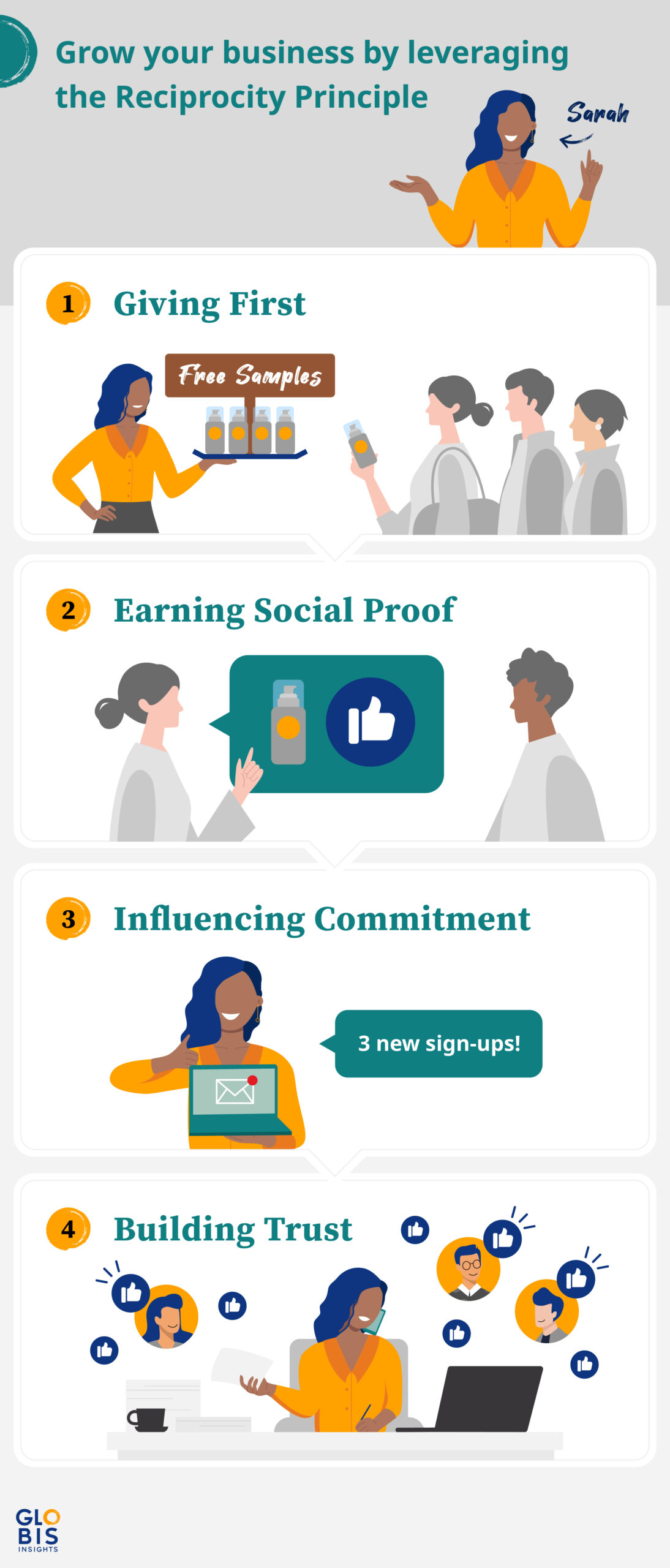In the business world, the ability to change decisions is not just beneficial —it’s essential. Developing this ability is not about manipulation or deceit; it’s about understanding and utilizing the principles of persuasion.
One such principle is called the reciprocity principle, coined by psychologist Robert Cialdini. Mastering the reciprocity principle can help you succeed in areas of business, from sales to negotiations.
Let’s talk about Sarah, a driven entrepreneur who recently launched a startup providing sustainable cleaning products. In her search for methods to drum up new business, she stumbles upon the reciprocity principle.
Next Article
Principled Negotiation: A Crash Course in Workplace Persuasion
4 Soft Skills in the Workplace That Employers Value
Unraveling the Reciprocity Principle
The reciprocity principle is based on the power of a simple social norm. People often feel an inherent obligation to return a favor when they receive one. Sarah sees an opportunity to leverage this phenomenon to drive her business’ growth.
Implementing the Reciprocity Principle: Giving First
Sarah begins by including the reciprocity principle in her marketing strategy.
She starts by sending out free samples of her sustainable stain remover to potential customers. This strategy serves two purposes: it allows potential customers to try her product, and it makes them more likely to feel a sense of obligation to reciprocate.

The Reciprocity Effect: Earning Social Proof
By offering a valuable product at no cost, the people who received free samples from Sarah will be more likely to want to return the favor. This could be in the form of a purchase, a recommendation to a friend, or leaving a positive review on an e-commerce platform.
Each positive action contributes to the social proof of her stain remover’s quality and effectiveness, further driving customer engagement and conversions.
The Power of Small Requests: Influencing Commitment
Sarah also leverages the power of smaller requests. She offers potential customers the chance to sign up for her newsletter. The principle at play here is that once someone commits to a small request, they are more likely to agree to larger requests later.
By getting her customers to sign up for her newsletter, Sarah is subtly influencing their behavior. Because they’ve committed to engaging with her brand through a newsletter, there’s an increased likelihood that they’ll feel a sense of commitment, and then support Sarah and her brand.
Ethical Use of the Reciprocity Principle: Building Trust
While the reciprocity principle is a powerful tool, Sarah recognizes the importance of using it ethically.
To keep things on the up-and-up, she’s transparent in her actions. She offers her services because she understands the value of sharing her product, rather than using it as a bribe.
Sarah uses the reciprocity principle to foster genuine relationships and build trust with her customers, both critical components for long-term business success.

The Reciprocity Principle in Negotiations
Sarah doesn’t just use the reciprocity principle with her customers. She applies it in her business negotiations as well.
For instance, in a bid to expand her distribution network, she offered a local grocery chain a deep discount to stock her products. While this move was a financial sacrifice on her part, the store returned the favor by giving her products prominent shelf space. While she is willing to make a concession, Sarah is also mindful of what she stands to lose in a negotiation.
By making the first concession in a negotiation, she prompted the other party to reciprocate, which will allow both parties to reach a compromise they can agree with.
While the principle of reciprocity can lead to mutual benefits, it is important to balance gains against potential losses.
Maximizing Benefits with the Reciprocity Principle
By strategically using the reciprocity principle, Sarah has increased her sales numbers, the size of her distribution network, and her customer engagement.
By giving first, establishing social proof, and building trust with her customers, she influenced her behavior and brought value to their lives. That’s a potent combination for success in business.
But she was also careful to use the reciprocity principle responsibly to maintain trust and achieve long-term success.
By utilizing these principles, you too can reap the rewards of reciprocity, and make a positive impact on your business.





